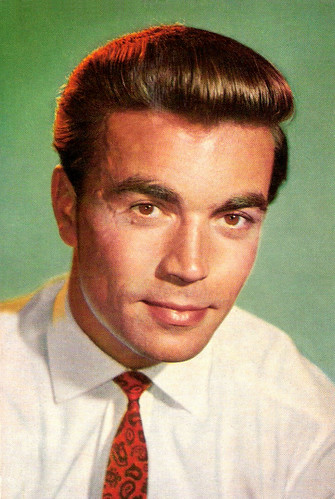
German postcard by WS-Druck, no. F 2. Photo: Ringpress / Vogelmann / Bavaria.
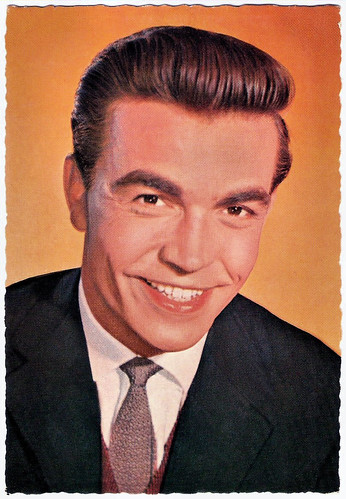
German postcard by WS-Druck, no. F 51. Photo: Ringpress / Vogelmann / Bavaria.
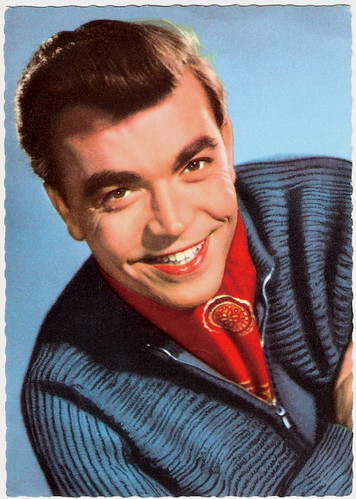
German postcard by Ufa, no. CK-80. Retail price: 30 Pfg. Photo: Arthur Grimm / Ufa.
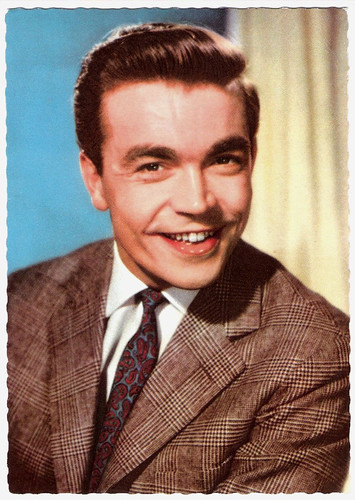
German postcard by Universum-Film Aktiengesellschaft (Ufa), Berlin-Tempelhof), no. CK-81. Retail price: 30 Pfg. Photo: Arthur Grimm / Ufa.
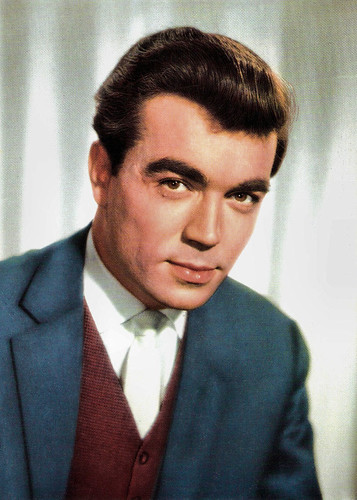
German card.
Romy's first kiss
Claus Biederstaedt was born in Stargard, Pommern, Germany (now Stargard Szczecinski, Poland) in 1928.
While on grammar school, he had to join the German army. Back from the war, he studied acting with Joseph Offenbach and Will Quadflieg at the Deutschen Schauspielhaus in Hamburg and worked from 1950 on as a stage actor in Hamburg, Berlin, München, Köln and Wiesbaden.
He made his film debut as a young assistant doctor in Die große Versuchung/The Great Temptation (Rolf Hansen, 1952) starring Dieter Borsche. He won for his part the Bundesfilmpreis as the Best Young Actor in 1953.
Next, he played the lead in the comedy Liebeskrieg nach Noten/Love War on Notes (Karl Hartl, 1953), a supporting role in Sauerbruch - Das war mein Leben/The Life of Surgeon Sauerbruch (Rolf Hansen, 1954) – a biography of the brilliant surgeon Ferdinand Sauerbruch, and he gave the then 16-years old Romy Schneider her first kiss in Feuerwerk/Fireworks (Kurt Hoffmann, 1954).
One of his best films was Drei Männer im Schnee/Three Men in the Snow (Kurt Hoffmann, 1955), based on the witty novel by Erich Kästner.

German postcard by WS-Druck, Wanne-Eickel, no. 7. Photo: Berolina / Constantin / Wesel.
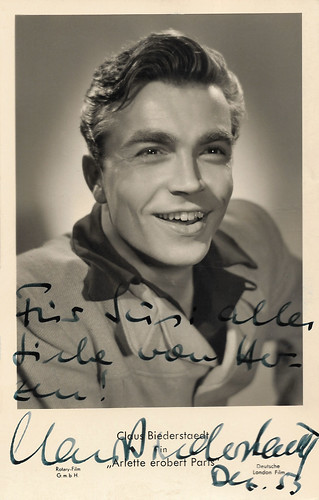
German autograph card. Photo: Rotary Film G.m.b.H. / Deutsche London Film. Claus Biederstaedt in Arlette erobert Paris/Arlette Conquers Paris (Viktor Tourjansky, 1953).
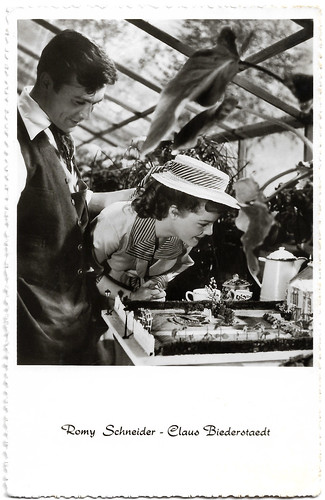
Dutch postcard by Int. Filmpers (I.F.P.), Amsterdam, no. 1229. Photo: Romy Schneider and Claus Biederstaedt in Feuerwerk/Fireworks (Kurt Hoffmann, 1954).

German postcard by Kolibri-Verlag. Photo: Lilo / NDF / Schorchtfilm. Claus Biederstaedt in Feuerwerk/Fireworks (Kurt Hoffmann, 1954).
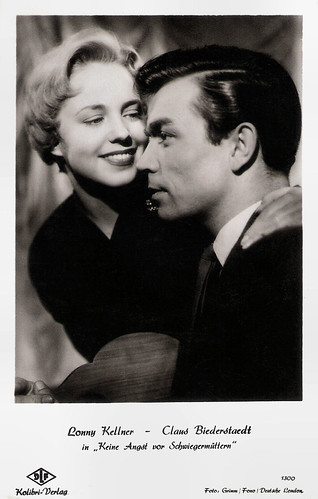
German postcard by Kolibri-Verlag G.m.b.H., Minden/Westf., no. 1300. Photo: Arthur Grimm / Fono / Deutsche London. Lonny Kellner and Claus Biederstaedt in Keine Angst vor Schwiegermüttern/Don't be afraid of mothers-in-law (Erich Engels, 1954).
Beloved romantic actor
From then on Claus Biederstaedt was one of the most beloved romantic actors of the German cinema, the always nice and friendly 'sonny boy'.
He played opposite many of the young female stars of the 1950s: Gardy Granass in Schwarzwaldmelodie/Black Forest Melody (Géza von Bolváry, 1956) and Die Christel von der Post/Christel of the Post Office (Karl Anton, 1956), Sabine Bethmann in Das Donkosakenlied/The Song of the Don Kosacks (Géza von Bolváry, 1956), Susanne Cramer in Kleines Zelt und große Liebe/Two in a Sleeping Bag (Rainer Geis, 1956) and Kindermädchen für Papa gesucht/Wanted: a Babysitter for Papa (Hans Quest, 1957), Germaine Damar in Die Beine von Dolores/Dolores' Legs (Geza von Cziffra, 1957) and Scala-total verrückt/Scala - Completely Gaga (Erik Ode, 1958), Maj-Britt Nilsson in Was die Schwalbe sang/The Song of the Swallow (Géza von Bolváry, 1956), and opposite Johanna von Koczian in Petersburger Nächte/Petersburg Nights (Paul Martin, 1958).
In 2004, he said in an interview with the German magazine Stern: "These films were not made to be broadcasted on television a half-century later. They arose from the time, the post-war period. People wanted to forget the smell of smoke and powder."

German postcard by Kunst und Bild, Berlin-Charlottenburg, no. I 273. Photo: Wesel / Berolina. Claus Biederstaedt in Es wird alles wieder gut/Everything Is Going to Be All Right (Géza von Bolváry, 1957).

German postcard by Kolibri-Verlag G.m.b.H., Minden/Westf., no. 308. Photo: Arthur Grimm / CCC / DFH. Johanna von Koczian and Claus Biederstaedt in Petersburger Nächte/Petersburg Nights (Paul Martin, 1958).

West-German postcard by Kunst und Bild, Berlin-Charlottenburg, no. S 775. Photo: Kurt-Ullrich-Film / Constantin / Wesel. Germaine Damar and Claus Biederstaedt in Die Beine von Dolores/The legs of Dolores (Géza von Cziffra, 1957).
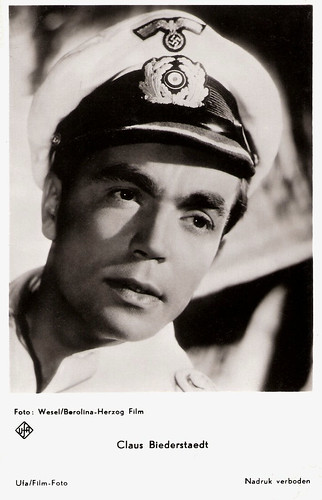
Dutch postcard, printed by Gebr. Spanjersberg N.V., Rotterdam (Dutch licency holder for Ufa/Film-Foto - the Universum Film Aktiengesellschaft, Berlin-Tempelhof), no. 3717. Photo: Wesel / Berolina / Herzog Film. Claus Biederstaedt in Blaue Jungs/Seamen (Wolfgang Schleif, 1957).
Brainless comedies and Heimat films
Claus Biederstaedt continued to appear regularly in comedies and Heimat films until the mid-1960s. He had also a supporting part in the thriller Hotel der toten Gäste/The Hotel With the Dead Guests (Eberhard Itzenplitz, 1965) starring Joachim Fuchsberger.
He then started to act in TV films and was also busy as a voice actor for the synchronisation of foreign films. He lent his deep, husky voice to Marlon Brando in films like Queimada (Gillo Pontecorvo, 1969) and Der letzte Tango in Paris/Ultimo Tango a Parigi/Last Tango in Paris (Bernardo Bertolucci, 1972), to Peter Falk in the detective TV series Columbo (1971-2003), to Yves Montand in films like César & Rosalie (Claude Sautet, 1972) and Vincent, Francois, Paul et les autres/Vincent, Francois, Paul and the Others (Claude Sautet, 1974), and to many other international film stars.
His last film role was in the sex comedy Auch ich war nur ein mittelmäßiger Schüler/I Wasn't a Very Good Student Either (Werner Jacobs, 1974). He regularly appeared as a guest star in TV series like Die Schwarzwaldklinik/The Black Forest Clinic (1988), Der Alte/The Old Fox (1980-1989), and Derrick (1979-1993).
In the 1980s and 1990s, he also worked as a stage director. Till 2008, he regularly performed on stage. In 2011 the newspaper Bild reported that Biederstaedt had been operated on for cancer and that three-quarters of his tongue had been removed. Sadly, this handicap did not permit him to act anymore.
Claus Biederstaedt passed away in Fürstenfeldbruck, Bavaria, just a few days before his 92nd birthday. He was married twice and had a son from his first marriage. With his second wife Barbara, he lived in Eichenau near München (Munich).
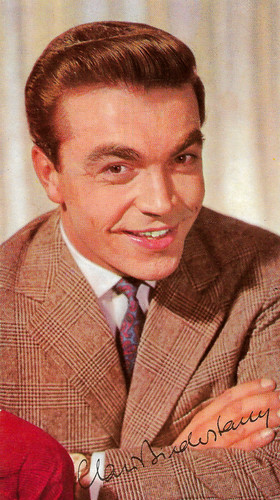
German collectors card by Lux.
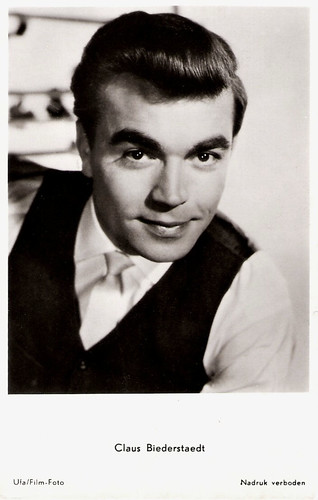
Dutch postcard by Gebr. Spanjersberg N.V., Rotterdam (Dutch licency holders of Ufa), no. 3688. Photo: Ufa/Film-Foto.

Dutch postcard by Gebr. Spanjersberg N.V., Rotterdam, no. 3690. Photo: Ufa/Film-Foto.
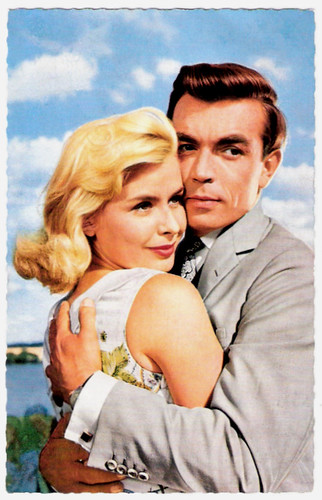
German postcard by Kolibri-Verlag, Minden/Westf. Photo: Constantin Film. Maj-Britt Nilsson and Claus Biederstadt in Was die Schwalbe sang/What the swallow sang (Géza von Bolvary, 1956).
Sources: Alexander Kühn (Stern - German), Peter Hoffmann (biografie.de - German), Wikipedia (German), and IMDb.
2 comments:
Peter, this is wonderful, so many memories come floating back. That is a great collection. He was always so well groomed! I remember faces and movies which I have forgotten since a long time.
Thank you for your nice comment! Paul.
Post a Comment